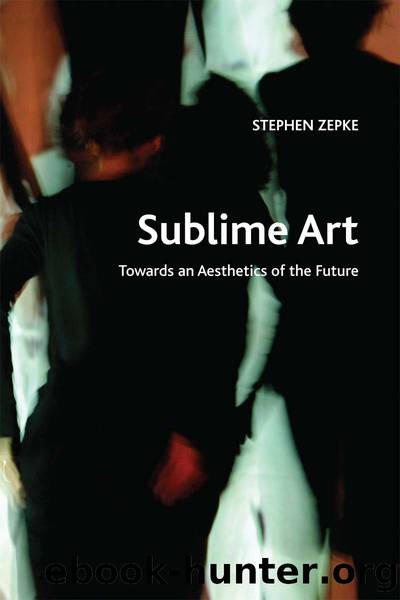Sublime Art by Zepke Stephen;

Author:Zepke, Stephen;
Language: eng
Format: epub
Publisher: Edinburgh University Press
4. Framing the Abyss – The Deconstruction of the Sublime
Both Derrida and Deleuze develop transcendental philosophy in the direction of difference, and both use the sublime to dissolve the bridge it supposedly forms between the sensible and supersensible, just as both see the foundation of experience to be transcendental difference. As well, they share a conception of difference that rejects the principle of contradiction, a difference that conditions everything but is not itself given. Perhaps it is this that inspired Derrida to claim ‘nearly total affinity’ with Deleuze’s philosophical ‘theses’ (2001: 192).
Nevertheless, there are fundamental differences between their respective accounts of difference. For Derrida, transcendental différance deconstructs the possibility of any supersensible ‘outside’ emerging from the sublime experience (différance is the condition of its impossibility, we might say), and so poses itself against any form of empiricism, including Deleuze’s ‘superior’ or ‘transcendental’ version. As Derrida clearly puts it:
The profundity of the empiricist intention must be recognized beneath the naiveté of its historical expressions. It is the dream of a purely heterological thought at its source. A pure thought of pure difference. Empiricism is its philosophical name, its metaphysical pretension or modesty. We say dream because it must vanish at daybreak, as soon as language awakens. (1978: 151)
Empiricism dreams of the outside, dreams of its outside, and this dream forever stands in the way of its fruitless desire to break through. So although différance deconstructs these ambitions, it also locates itself within the Kantian distinction of transcendental and empirical realms as the condition of their deconstruction. This is Derrida’s version of Critique, one in which the deconstruction of metaphysics is ‘this simultaneously faithful and violent circulation between the inside and the outside of philosophy’ (1982: 6). In this sense, the abyss between the Kantian faculties remains the subject’s condition of possibility and impossibility, and Derrida’s work hovers unfaithfully on the edge of a recognisably Kantian project.
Although, as we have seen, Deleuze finds the conditions for his own version of transcendental philosophy in Kant, and specifically in a close and arguably ‘faithful’ reading of Kant’s sublime, this leads him to a ‘higher power’ of difference, one by which its repetition as sensation destroys any transcendental subjectivity as it launches itself onto a path of experimentation to create the new. In this sense difference is the transcendental condition for what is, but according to Deleuze it is a condition of real rather than possible experience (1994: 154). For Deleuze difference is thought, whereas for Derrida différance is the condition of thought, a thought in which the subject and its sensibility are not shattered but continually re-inscribed in a playful and infinite deferral. As Derrida categorically puts it: ‘By definition, difference is never in itself a sensible plenitude’ (1976: 53). As a result, Derrida’s ‘sign’ inscribes the limit of thought, a limit whose appearance describes, and in describing defers, the real. Deleuze on the other hand, couches his transcendental or superior empiricism in almost opposite terms. The sign, he says, marks the overcoming of
Download
This site does not store any files on its server. We only index and link to content provided by other sites. Please contact the content providers to delete copyright contents if any and email us, we'll remove relevant links or contents immediately.
The Secret History by Donna Tartt(18157)
Red Sparrow by Jason Matthews(5195)
Harry Potter 02 & The Chamber Of Secrets (Illustrated) by J.K. Rowling(3555)
In a Sunburned Country by Bill Bryson(3364)
Drawing Cutting Edge Anatomy by Christopher Hart(3290)
Figure Drawing for Artists by Steve Huston(3267)
Harry Potter and the Prisoner of Azkaban (Book 3) by J. K. Rowling(3108)
The Daily Stoic by Holiday Ryan & Hanselman Stephen(3107)
Japanese Design by Patricia J. Graham(2998)
The Roots of Romanticism (Second Edition) by Berlin Isaiah Hardy Henry Gray John(2819)
Make Comics Like the Pros by Greg Pak(2757)
Stacked Decks by The Rotenberg Collection(2685)
Harry Potter and the Deathly Hallows (7) by J.K. Rowling(2549)
Draw-A-Saurus by James Silvani(2501)
Tattoo Art by Doralba Picerno(2484)
On Photography by Susan Sontag(2482)
Foreign Devils on the Silk Road: The Search for the Lost Treasures of Central Asia by Peter Hopkirk(2385)
Churchill by Paul Johnson(2360)
The Daily Stoic by Ryan Holiday & Stephen Hanselman(2341)
